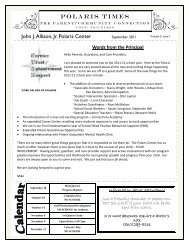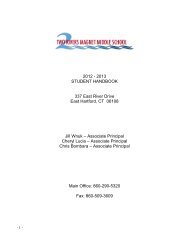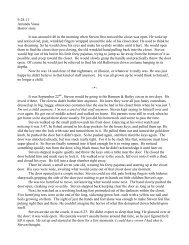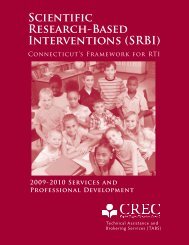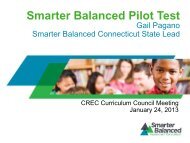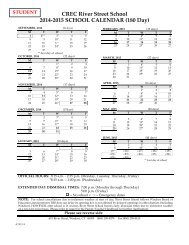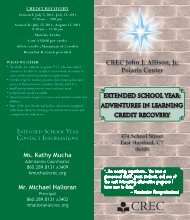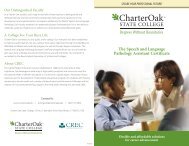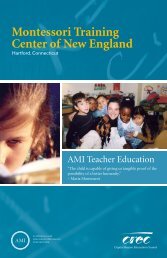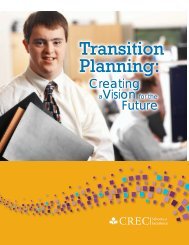<strong>Reading</strong> Curricular Calendar, Second Grade, 2012-201314character faced his problems to help us with this. Students may find a number of lessons in theirbooks in addition to the moral highlighted at the end.Meanwhile, children will continue to read their fiction books, <strong>and</strong> you’ll want to be sure theyread them thinking about the lessons they are learning. Remind them that all stories containlessons, <strong>and</strong> it is our job as readers to think about what those lessons might be. Perhaps theycould take their Post-its from their fairy tale/fable books <strong>and</strong> attach them to similar passages intheir fiction books. Or you could reread parts of a story you’ve previously read aloud <strong>and</strong> havechildren hold up their fairy tale/fable Post-its when they recognize a similar passage. You mightalso encourage children to read with a critical lens <strong>and</strong> start to question their stories. Readersmight notice that many fairy tales end with the prince <strong>and</strong> the princess living “happily ever after”or that the good guy always wins, <strong>and</strong> they might point out that this is not always true in life.Meanwhile, the modern-day stories they read may not have such happily-ever-after endings,though they may nonetheless end on a positive note. Readers can think about the lesson theythink an author is trying to teach them <strong>and</strong> ask themselves, “Do I buy it?” or “Does the good guyalways win?” or “Was that the best way to teach the lesson?”As children read several books that go together, emphasize the importance of rereading. Often,we spend the first read focusing largely on the literal happenings; then, when we reread, wemake more inferences. The real goal, of course, is that your readers think <strong>and</strong> talk across books,noting similarities that exist on many levels. By inviting children to help reorganize the library<strong>and</strong> to think about new book baskets, you open up more opportunities for them to think about allthe ways books can go together.As the unit comes to a close, a fun way to celebrate is through a performance of books childrenhave read <strong>and</strong> studied. Partnerships or clubs can work together, drawing on all they have learnedabout directing <strong>and</strong> acting, about characters, author’s intent, <strong>and</strong> so on, to put on a show full ofdrama. Students can revisit a story they most care about, not just reading it together but havingan extensive talk about it, before presenting it to the class, to their parents, or to whoever youinvite to their celebration. Have them rehearse for a day or two first, paying only a little attentionto props <strong>and</strong> much more attention to the tone, facial expressions, <strong>and</strong> enthusiasm they bring totheir reading.Word Study/Phonics/Shared <strong>Reading</strong>By this point of the year, you will either solidify word study concepts you’ve already taught orintroduce new <strong>and</strong> more sophisticated word study concepts. Word study will continue to be moresmall-group work than whole-class instruction, because this allows you to fine-tune yourteaching to the needs of particular students. According to the Common Core, you will want tomake sure your students can decode regularly spelled two-syllable words with long vowels <strong>and</strong>words with common prefixes <strong>and</strong> suffixes. You will want to give your students plenty ofopportunities to practice decoding these words (with some prompting) within their independentreading. Prompts you might use include, “Notice the syllables.” “Look at the base word [prefix,suffix].” “Where can you break up the word?” Some students will be ready for this instruction,while others will still need to solidify earlier features in spelling development.Unit Six – <strong>Reading</strong> <strong>and</strong> <strong>Role</strong> <strong>Playing</strong>: <strong>Fiction</strong>, <strong>Folktales</strong>, <strong>and</strong> <strong>Fairy</strong> <strong>Tale</strong>s<strong>Reading</strong> <strong>and</strong> Writing Project, 2012 ©DRAFT
<strong>Reading</strong> Curricular Calendar, Second Grade, 2012-201315You might spend one or two days determining each student’s current stage of spellingdevelopment <strong>and</strong> forming new groups based on your assessments. For example, you may havenoticed that some students still need to work on some of the concepts you introduced in theprevious months, such as long vowel patterns, while others still need to work on prefixes <strong>and</strong>suffixes. Both groups can work on sorting words but the content will be different. You’ll alsowant to have students complete some “blind” writing sorts, in which one partner reads the word<strong>and</strong> the other partner writes it in the correct column. If you haven’t done so already, you mightalso introduce word hunts in which children search their independent reading for concepts theyhave been working on in word study. If most children are still having difficulty with conceptsyou taught in the previous months, spend the first couple of weeks reviewing those concepts withthe whole class.You may also want to spotlight reading with expression during shared reading. The most obviousway to do this is to help readers attend to punctuation. Shared reading is also the time to remindchildren to orchestrate all they know, <strong>and</strong> to use strategies flexibly. Teach them to try onestrategy <strong>and</strong> then another <strong>and</strong> another until they figure out the word. In addition, some studentsmay be getting quite proficient at decoding difficult words but struggle to figure out the meaningof words. Teach this group how to use the picture <strong>and</strong> sentences around a word to look for clues.Shared reading is also a good time to practice reader’s theatre, which increases children’sfluency, comprehension, <strong>and</strong> decoding skills. Prompt students to notice the spelling patterns youhave been studying during word study. You may decide to write some reader’s theatre piecesduring interactive writing <strong>and</strong> reread these pieces during shared reading.Below are a few suggested lessons to support your word study curriculum, based on features ofspelling in which many second graders tend to need explicit instruction:If You Decide to Teach . . .Long vowel spelling patternsRecognizing consonants withtwo sounds (c <strong>and</strong> g)Prefixes <strong>and</strong> suffixesSuggested LessonsinWords Their Way,4th Ed.6-2, 6-4 to 6-15 (pp.189–199)See AdaptableGames (p. 220)See AdaptableGames (p.220)7-9 (pp. 226–227)Suggested Lessons in Phonics Lessons,Grade 2, Pinnell & FountasSP 3 to SP 6 (pp. 173–178)SP 9 (pp. 197–200)SP 11 (pp. 205–208)SP 13 to SP 15 (pp. 213–224) SP 17 (pp.229–232)LS 14, LS 15 (pp. 123–130)WS 13 to WS 18 (pp. 351–373)WS 21 to WS 22 (pp. 383–390)High-frequency words pp. 182–83 HF1 to HF 9 (pp. 235–270)Unit Six – <strong>Reading</strong> <strong>and</strong> <strong>Role</strong> <strong>Playing</strong>: <strong>Fiction</strong>, <strong>Folktales</strong>, <strong>and</strong> <strong>Fairy</strong> <strong>Tale</strong>s<strong>Reading</strong> <strong>and</strong> Writing Project, 2012 ©DRAFT



